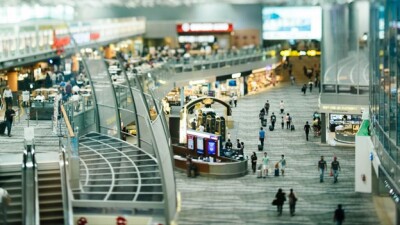Earlier this month, Cepton, a provider of lidar solutions for use cases like autonomous driving, smart cities, and facility management, announced that it was expanding its lidar technology presence at Tampa International Airport (TPA) to enable “groundbreaking” lidar-based AI analytics. The lidar solutions at TPA are deployed by The Indoor Lab, a Cepton partner who specializes in analyzing lidar data to monitor real-time foot traffic.
With this partnership, The Indoor Lab will be deploying lidar-based single sensing technology within a unified software platform in order to gain insights on both indoor and outdoor spaces within TPA 24 hours a day. According to the announcement of the news, the deployment of these solutions will enable the airport to “improve safety and efficiency at the entrance, pickup and drop-off areas, the terminals, and the airfield.” They continue to note that this is a first-of-its-kind implementation, combined with AI, in an airport like this.
“Lidar’s high-accuracy, real-time perception capabilities can improve almost every aspect of airport operations. In addition to indoor crowd analytics, which aid in staffing optimization, cleanliness maintenance, concession line management, TSA wait time management and terminal safety, lidar also offers real-time outdoor measurements,” Patrick Blattner, CEO of The INdoor Lab, said in a statement. “Unlike cameras, lidar is impervious to lighting conditions or overhead mounting restrictions. Cepton lidars provide a wide field of view where every point in the 3D point cloud is measurable. This makes lidar the only technology on the horizon capable of fully leveraging AI's operational efficiencies.”
The Indoor Lab was founded in 2015 and is now owned by Blattner Technologies following an acquisition earlier this year. They specialize in using lidar combined with AI and other analytics techniques to measure people, objects and behavior, “to harness the transformative power of technology … in order to create a more harmonious and secure world.” Cepton, meanwhile, provides a number of lidar solutions – both hardware and software – for a variety of use cases around smart cities, movement, and tracking. Earlier this year, for example, they released their new Vista-X90 Plus lidar sensor designed for the automotive industry.
We know there are a wide variety of use cases for lidar technology, including autonomous driving and of course reality capture and surveying. Tracking people and movement isn’t one of the most well-known or most utilized use cases, but it’s one that will likely continue to grow over the next few years as awareness grows and both sensors and software becomes more accessible. More importantly, the systems will be able to provide more information as AI technology continues to mature and provide key insights with little intervention.
In facilities like airports where many people are coming and going through complex structures, and where security is paramount, lidar can be particularly valuable. In people tracking, it’s important to have clear information about individuals, but to do so without collecting personal information about individuals, which is hard to avoid with regular cameras. Security can have multiple meanings in this context, and one of them is securing personal information. As Dr. Jun Pei, CEO and co-founder of Cepton, has written for Geo Week News, lidar can be a key tool in removing bias from AI systems for people tracking.
Brunno Moretti, Senior Vice President of Product and Commercial Operations, says: “The Indoor Lab is at the forefront of lidar technology adoption in airport settings. Since 2019, Cepton and The Indoor Lab have been working closely to make air travel safer and more enjoyable for worldwide passengers. We are thrilled to expand the implementation of our lidar technology to cover both indoor and outdoor applications at Tampa International Airport. We believe lidar as a privacy-compliant sensor technology will transform the future of smart spaces.”
"We are proud to collaborate with Cepton in expanding lidar's use cases within the airport environment through this seven-year partnership with TPA," Blattner added. "From the moment a passenger gets dropped off at the airport, to going through security, boarding the plane and finally taking off, we are breaking new ground with products and services designed to enable a safer, more productive, and much improved passenger experience, paving the way for the airport of the future.”






